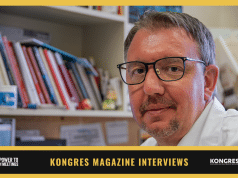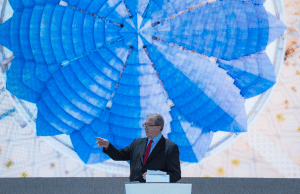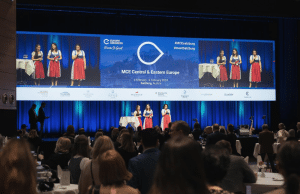The coronavirus pandemic has been revoked, but it would be naive to think everything will simply fall back into place like it never happened. Many industries will keep feeling the effects for some time and one of the most affected is surely the meetings industry. A group of industry experts formed an initiative committee to share their thoughts and concerns with the government and try to persuade the competent authorities to help keep the meetings industry on its feet.
We asked members of the initiative committee for the preservation of the Slovenian meetings industry for their thoughts on the current situation, post-COVID-19 times and governmental help.
mag. IZTOK BRICL, Managing Director at GR – Ljubljana Exhibition and Convention Centre
Q: What is your official position on the measures taken so far by the Slovenian Government to help the Slovenian meetings industry?
If we draw the line, the government has not treated us separately so far. We belong in the economy department, more specifically under tourism. However, since the drop in business will not only be 10 %, which has been the condition for the implementation of measures so far, but will, without the second wave of coronavirus, certainly exceed a 30 % annual revenue drop for most representatives and up to 80 % for some, we expect additional measures that are a condition for our survival.
Q: What will be the revenue drop in your company compared to 2019? How many events did you have to postpone or cancel?
Until 7 March this year, when we had to prematurely close the 59th Home Fair due to the outbreak of the pandemic in Slovenia, we operated normally. Compared to the same period in 2019, the turnover was even slightly better. From March until the end of August this year, we do not expect any significant business.
So far, we have cancelled as many as 7 of the 9 planned large international congresses, proms, some corporate events, the Days of Intergenerational Coexistence tradeshow, which we organize together with the Pensioners’ Association of Slovenia, some fairs from other organizers, house fairs, etc.
From September until the end of this year, according to the optimistic scenario, we could organize some autumn fair events, such as the fair promoting a healthy lifestyle Nature-Health (October 21-24) and the furniture fairs Ambient Ljubljana and Dom+ (November 11-15), and conduct or facilitate fairs of other organizers. We are still planning to hold two international congresses. There are also some concerts and corporate parties in the GR event calendar. According to the pessimistic scenario, of course, we will not be able to carry out any of these events.
The losses compared to last year’s revenue will amount to something between 40 and 50 %.
without international mobility, our activities will be very limited
Q: What does the current situation mean for event planning? What would make your business much easier in this regard?
The joint planning of crisis measures in different scenarios in the event of a possible pandemic reoccurrence would significantly facilitate our business. For example: if the epidemiological situation in the country looks like this, and in the world like this, such and such measures will be put in place… Currently, due to the lack of information, we cannot realistically plan the future of our business. We plan events in the meetings industry well in advance, congresses are planned two years or more in advance and fairs at least half a year ahead of time. Therefore, without clear provisions, it is very difficult to offer our services or do our business.
We understand that no one actually knows what else is going to happen in connection with the COVID-19 outbreak, but it should be known what measures will be taken in a specific situation. Transparent hypothetical scenarios and clear pertaining instructions are therefore crucial for our work.
Q: During the crisis, we found that events could also be organized remotely. What is your position on this?
We already knew before the crisis that events could be organized remotely. Yet live contact is something completely different. It is invaluable because we humans are social beings, so we also like to socialize in an informal context, during conference breaks and the accompanying program, etc. Experience shows that most interaction between participants takes place right there …
Q: What are your crisis exit strategies? Are you preparing any innovations?
We will upgrade the events we organize as much as possible also in digital form. This will add value in case we will be able to host the event. However, given we will not be able to carry out the live event due to the epidemiological situation, this will prevent our work and the work of our clients from going to waste.
Q: The initiative to preserve the Slovenian meetings industry was signed by almost 700 individuals. How do you evaluate the initiative and could it lead to a new formal movement or integration?
Connecting is always helpful. Together we are stronger. However, we are also different, which means that it will be necessary to invest energy into getting to know each other and coordinating in the future. A professional association of all those involved in the meetings industry under appropriate auspices, e.g. The Chamber of Commerce of Slovenia certainly has a future.
Q: What did the forced break mean for you personally? Has it given you a glimpse into the meetings industry from a distance? What is your view?
The forced break shows us several faces: vulnerability interdependence, international involvement… In such situations, new opportunities always arise.
Personally, regardless of the situation, I will continue to make every effort to preserve and develop GR. Our personnel in particular, as they are highly specialized and irreplaceable for the restart of our work. Already today, however, it is unfortunately clear that our activity will not be able to restart as quickly as it was shut down.
Q: Tell us why the Slovenian government must urgently support the Slovenian meetings industry.
The meetings industry does not only generate revenue in companies directly related to the industry but in an environment, where revenue is multiplied by a factor of 4-7.
At the same time, business events, typical for congress and fair activities are also the engine of economic and scientific development, which means that their value is priceless.














